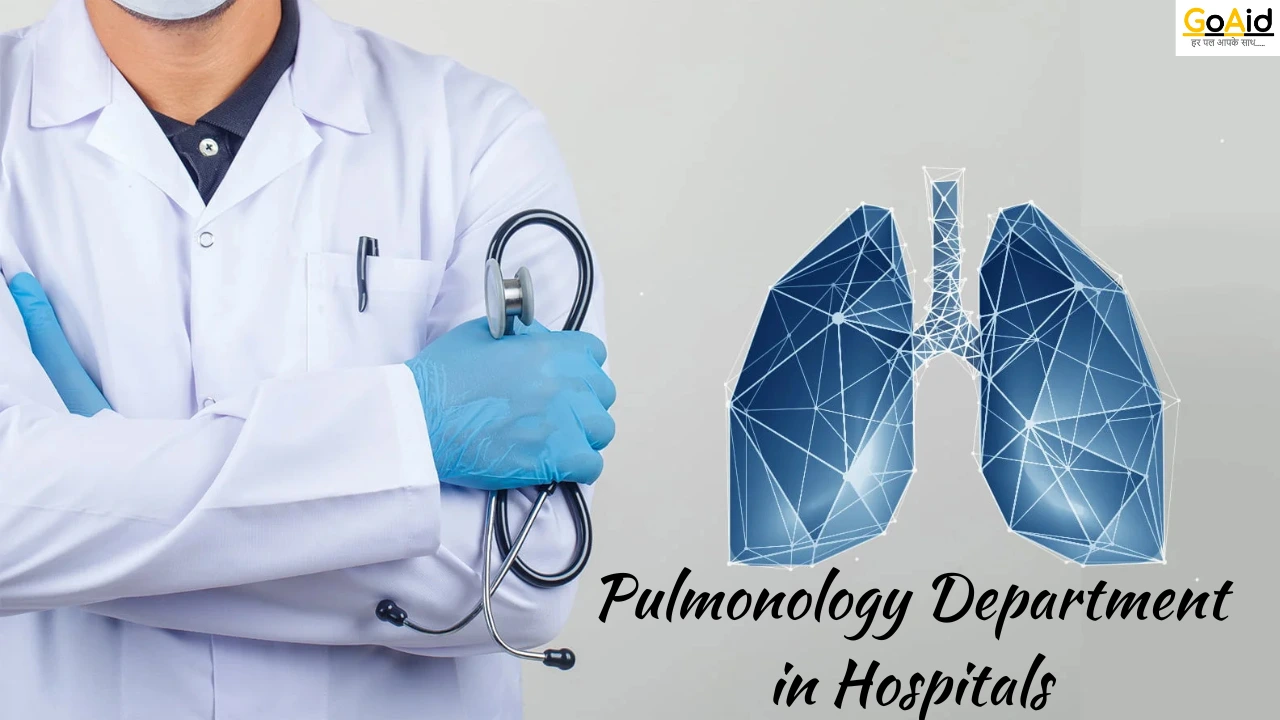Have you ever visited your nearby hospitals? Then you must have noticed the Pulmonology department in the hospital. Well, those hospitals with a good name for treating disorders related to the heart must have an active Pulmonology Department. Even if you have no idea what Pulmonology means and what Pulmonology departments in Hospitals are, no need to worry about it! Because we have simplified this educational journey for you.
In this blog, we have added comprehensive details about the Pulmonary Medicine department in the Hospital. We have provided you with details about the department’s roles and responsibilities, features and specialties, treatment provided under the department, essential equipment used in this department, and how you can choose the best Pulmonary Medicine hospitals in India.
So, letŌĆÖs start-
Complete Guide to the Pulmonology Department in Hospital
We have added comprehensive details to the Pulmonary Medicine Department in the Hospital and explained each component. This blog will provide you with full details about the Pulmonary Medicine Department in the Hospital, eliminating the need to read other sources.
What is the Pulmonology Department in the Hospital? ŌĆō What does Pulmonology mean?
The Pulmonary Medicine department in a hospital specializes in diagnosing and treating respiratory and lung-related conditions. Understanding Pulmonary Medicine’s meaning is essential, as it encompasses various aspects of lung health, including function, diseases, and treatments.
What does Pulmonology mean?
The Department of Pulmonology provides comprehensive care for conditions such as asthma, chronic obstructive pulmonary disease (COPD), pneumonia, and pulmonary fibrosis, which can significantly impact a patient’s quality of life.
In the Pulmonology department in hospitals, healthcare professionals utilize Pulmonology significant tests like pulmonary function tests, bronchoscopy, and imaging studies to assess lung function and determine appropriate Pulmonology treatment options. This specialized department is equipped with advanced technology and staffed by specialists trained in medical Pulmonology, ensuring that patients receive high-quality care tailored to their individual needs. Ultimately, the Pulmonology departments play a vital role in managing respiratory health and enhancing patient outcomes through early diagnosis and effective treatment strategies.
Roles and Responsibilities in Pulmonology Department in Hospitals
These are the key roles and responsibilities of the Pulmonology Department in Hospitals:
1. Patient Evaluation
The primary responsibility of the Pulmonology department is to conduct thorough evaluations of patients with respiratory symptoms. This includes reviewing medical histories, performing physical examinations, and identifying risk factors associated with lung diseases.
2. Conducting Pulmonology Tests
Specialists in the department of Pulmonology perform various Pulmonology significant tests, such as spirometry and chest X-rays, to assess lung function and diagnose conditions accurately, guiding appropriate treatment plans.
3. Developing Treatment Plans
Based on evaluation and test results, the Pulmonology department in hospitals formulates individualized Pulmonology treatment plans. These plans may include medications, pulmonary rehabilitation, and lifestyle changes tailored to each patientŌĆÖs needs.
Read More: Difference Between OPD And IPD: Comprehensive Guide
4. Management of Chronic Conditions
The department is responsible for the ongoing management of chronic respiratory diseases, such as asthma and COPD. This includes monitoring symptoms, adjusting treatments, and providing education to help patients manage their conditions effectively.
5. Coordinating Care with Other Specialists
The Pulmonology departments collaborate with other healthcare providers, including allergists and primary care physicians, to ensure comprehensive care for patients with respiratory issues, addressing all aspects of their health.
6. Providing Education and Support
Educating patients about lung health, treatment options, and preventive measures is a crucial role of the medical Pulmonology team. This empowers patients to take an active role in managing their respiratory health.
7. Performing Procedures
The department is equipped to perform various procedures, such as bronchoscopy and thoracentesis, which are essential for diagnosing and treating lung conditions. These procedures are carried out with a focus on patient safety and comfort.
8. Emergency Care Management
Pulmonologists are trained to handle acute respiratory emergencies, providing critical care in the hospital Pulmonology ward for conditions such as respiratory failure and severe asthma exacerbations.
Know More: The History of Ambulance Service: Evolution from Past to Future
9. Engaging in Research and Clinical Trials
The Department of Pulmonology often participates in research activities, allowing patients access to innovative therapies and contributing to advancements in the field of respiratory medicine.
10. Ensuring Equipment Maintenance
Maintaining essential equipment in the Pulmonology ward is vital for accurate diagnosis and treatment of patients. This includes ensuring that ventilators, nebulizers, and other diagnostic tools are functioning optimally.
Features and Specialities of the Pulmonology Department
These are the key features and specialties of the Pulmonology Department:
1. Comprehensive Respiratory Care
The Pulmonology department provides a full spectrum of care for respiratory conditions, ranging from routine evaluations to advanced treatment plans, ensuring holistic management of lung health for patients.
2. Advanced Diagnostic Techniques
Equipped with cutting-edge technology, Pulmonology departments utilize sophisticated diagnostic tools such as bronchoscopy, pulmonary function tests, and imaging studies to accurately assess lung conditions and guide treatment.
3. Multidisciplinary Team Approach
A team of specialists, including pulmonologists, respiratory therapists, and nurses, work collaboratively within the Department of Pulmonology to develop comprehensive care plans that address the diverse needs of patients with respiratory issues.
Also Read: Essential Equipment in Ambulances: What You Need to Know
4. Pulmonary Rehabilitation Programs
The Pulmonology department in hospitals often offers pulmonary rehabilitation programs, which include exercise training, education, and support, helping patients manage chronic lung diseases and improve their quality of life.
5. Management of Sleep Disorders
Many Pulmonology departments specialize in the diagnosis and treatment of sleep-related respiratory disorders, such as sleep apnea, providing tailored treatment options to enhance sleep quality and overall health.
6. Access to Innovative Treatments
The medical Pulmonology team stays abreast of the latest advancements in respiratory care, offering patients access to new therapies and clinical trials that can improve treatment outcomes for various lung diseases.
7. Emergency Response Capabilities
The hospital’s Pulmonology ward is equipped to handle acute respiratory emergencies, ensuring prompt and effective care for conditions such as severe asthma attacks, pneumonia, and respiratory failure.
9. Patient Education and Support
Patient education is a key feature of the Pulmonology departments, with healthcare professionals providing valuable information on managing respiratory conditions, medications, and preventive strategies to empower patients.
9. Infection Control Measures
Given the susceptibility of respiratory patients to infections, the Department of Pulmonology implements strict infection control protocols to safeguard patients, especially in hospital settings and during procedures.
- Research and Clinical Trials
The Pulmonology department actively engages in research initiatives, allowing patients to participate in clinical trials for emerging treatments and contributing to the advancement of knowledge in the field of respiratory medicine.
Read More: Dermatology Department in Hospitals
What treatment is provided in the Pulmonology Department?
These are the key disorders and conditions that get treated in the Pulmonology Department of Hospitals:
1. Asthma Management
The Pulmonology department provides comprehensive treatment plans for asthma, including medications such as inhalers and oral corticosteroids. Patients receive education on trigger avoidance and proper inhaler techniques to effectively manage their symptoms.
2. Chronic Obstructive Pulmonary Disease (COPD) Treatment
The Department of Pulmonology offers tailored treatment for COPD, which may include bronchodilators, corticosteroids, and pulmonary rehabilitation programs to improve lung function and enhance the quality of life for patients.
3. Pneumonia Care
Patients diagnosed with pneumonia receive prompt treatment in the Pulmonology department. Treatment may include antibiotics, bronchodilators, and supportive care, such as oxygen therapy, to help manage symptoms and promote recovery.
4. Pulmonary Fibrosis Management
The Pulmonology departments focus on managing pulmonary fibrosis through medications that slow disease progression and symptom management strategies, including pulmonary rehabilitation and supplemental oxygen.
Know More: Gastroenterology Department in Hospitals
5. Sleep Apnea Treatment
The department offers comprehensive evaluation and treatment for sleep apnea, including continuous positive airway pressure (CPAP) therapy, lifestyle changes, and, in some cases, surgical options to improve sleep quality.
6. Lung Cancer Care
The hospital Pulmonology ward provides multidisciplinary care for lung cancer patients, including diagnosis, staging, and treatment options such as chemotherapy, targeted therapy, and referrals for surgical interventions.
7. Bronchitis Treatment
Patients with acute or chronic bronchitis receive treatment in the Pulmonology department, which may involve bronchodilators, corticosteroids, and pulmonary rehabilitation to alleviate symptoms and improve lung function.
8. Pulmonary Hypertension Management
The Department of Pulmonology addresses pulmonary hypertension through a combination of medications, lifestyle modifications, and supportive care to manage symptoms and improve the patient’s quality of life.
9. Respiratory Infections Management
Treatment for various respiratory infections, such as tuberculosis and bronchitis, is provided in the Pulmonology department, including appropriate antibiotic or antiviral therapies, along with close monitoring of the patient’s condition.
10. Pulmonary Rehabilitation
The Pulmonology department offers pulmonary rehabilitation programs designed to help patients with chronic respiratory diseases improve their physical endurance, learn breathing techniques, and receive nutritional counseling for overall health improvement.
Also Read: Top 10 Ambulance Services in India
Essential Equipment used in the Pulmonology Department
These are some of the major instruments or equipment that are generally used in the Pulmonology Department of Hospitals:
1. Spirometer
A spirometer is a critical tool used to measure lung function by assessing the volume and flow of air during breathing. This device helps diagnose conditions such as asthma and COPD and monitor treatment efficacy.
2. Bronchoscope
A bronchoscope is a flexible tube equipped with a camera and light source that allows pulmonologists to visualize the airways and lungs. This equipment is used for diagnostic purposes and therapeutic interventions, such as removing obstructions or taking biopsies.
3. Pulse Oximeter
This non-invasive device measures the oxygen saturation level in a patientŌĆÖs blood, providing essential information about lung function and oxygen delivery. It helps monitor patients during treatments and post-operative care.
Know More: Complete Details About First Aid | Types, Benefits & Tips
4. Chest X-ray Machine
Chest X-rays are a standard imaging tool in the Pulmonology department used to identify lung conditions, such as infections, tumors, or structural abnormalities. This equipment is crucial for initial assessments and follow-ups.
5. Computed Tomography (CT) Scanner
A CT scanner provides detailed cross-sectional images of the lungs, helping in the diagnosis of complex conditions such as lung cancer, pulmonary embolism, and interstitial lung disease. It offers greater detail than standard X-rays.
6. Nebulizers
Nebulizers are used to administer medication directly into the lungs in aerosol form, providing relief for patients with conditions such as asthma and COPD. They are especially beneficial for those who struggle with inhalers.
7. Mechanical Ventilator
Mechanical ventilators are essential in the hospital Pulmonology ward for patients experiencing respiratory failure. They assist or control breathing, delivering oxygen, and removing carbon dioxide effectively during critical care situations.
8. Oxygen Therapy Equipment
Equipment such as oxygen concentrators and tanks is used to provide supplemental oxygen to patients with respiratory disorders. This equipment ensures that patients maintain adequate oxygen levels for optimal health.
Also Read: The Obstetrics and Gynecology Department in Hospital
9. Flow Meters
Flow meters measure the flow rate of air inhaled and exhaled by a patient. This equipment helps assess respiratory function and is particularly useful in monitoring patients with chronic lung diseases.
10. Respiratory Therapy Equipment
This includes various devices like CPAP machines for sleep apnea treatment, positive expiratory pressure (PEP) devices, and airway clearance systems, which aid in managing respiratory conditions and improving lung function.
How to Choose the Best Pulmonology Hospital in India?
You can use these points as guiding steps to find and choose the best Pulmonology Hospital in India:
1. Research Hospital Reputation
Investigate the reputation of hospitals known for their Pulmonology departments by reading patient reviews and testimonials. A well-regarded hospital often indicates a higher quality of care and successful patient outcomes.
2. Check for Accreditation
Ensure the hospital is accredited by recognized healthcare organizations. Accreditation signifies that the Department of Pulmonology adheres to established standards of care and maintains quality facilities and practices.
Read More: The Radiology Department in Hospital
3. Evaluate the Medical Team
Review the qualifications and experience of the pulmonologists and support staff within the medical Pulmonology team. Experienced specialists with relevant credentials are crucial for accurate diagnosis and effective treatment.
4. Assess Available Services
Look for hospitals that offer a comprehensive range of Pulmonology services in hospitals, including diagnostics, treatments, and specialized care for various respiratory conditions, ensuring all patient needs are met.
5. Consider Technological Advancements
Choose a hospital that utilizes the latest technology and equipment in the Pulmonology department. Advanced tools facilitate accurate diagnosis and effective management of respiratory diseases.
6. Evaluate Patient Care Facilities
Assess the quality of patient care facilities available in the hospital Pulmonology ward. Comfortable accommodations, modern amenities, and supportive staff contribute to a positive patient experience.
7. Investigate Multidisciplinary Care Options
Opt for hospitals that provide a multidisciplinary approach, where pulmonologists collaborate with other specialists to create comprehensive care plans that address all aspects of a patientŌĆÖs health.
Also Read: Full Details about Neurology Department in Hospitals
8. Review Emergency Care Capabilities
Ensure the hospital is equipped to handle respiratory emergencies effectively. Access to an emergency department and well-trained staff is crucial for managing acute respiratory conditions.
9. Check for Follow-Up Care
Inquire about the availability of follow-up care and support services after treatment. Ongoing management is essential for chronic respiratory conditions, ensuring patients receive continued guidance and care.
10. Verify Insurance Coverage
Confirm whether the Pulmonology department accepts your health insurance plan. Understanding financial responsibilities before treatment can alleviate stress and ensure that patients receive necessary care without unexpected costs.
Book Ambulance: GoAid Ambulance Service
Conclusion to the Pulmonology Department
In conclusion, the Pulmonology department plays a vital role in diagnosing, treating, and managing a wide range of respiratory conditions that significantly impact patient health. Through advanced diagnostic tools and personalized Pulmonology treatment plans, healthcare professionals in this specialized department ensure comprehensive care for patients with conditions such as asthma, COPD, and lung infections.
Collaboration among multidisciplinary teams enhances the effectiveness of treatments, promoting better patient outcomes and quality of life. Furthermore, the importance of the Pulmonology department in hospitals cannot be overstated, as it directly contributes to the management of chronic respiratory diseases and the promotion of overall lung health.
By understanding the services and specialties offered, patients can make informed decisions regarding their respiratory care. We have provided you with all the details about the Pulmonology Department in hospitals. If you have any questions, please ask in the comment box!
FAQ
Question 1: What is the Pulmonology department in hospitals?
Answer: The Pulmonology department in hospitals specializes in the diagnosis and treatment of diseases related to the lungs and respiratory system. It focuses on conditions like asthma, chronic obstructive pulmonary disease (COPD), pneumonia, lung cancer, and other respiratory infections. Pulmonologists in this department are experts in managing any issues related to breathing, lung capacity, and respiratory health.
Question 2: What does medical pulmonology refer to?
Answer: Medical pulmonology is a subspecialty of medicine that deals with the diagnosis and treatment of respiratory diseases, without the need for surgery. This branch focuses on lung diseases such as bronchitis, pneumonia, emphysema, and pulmonary fibrosis, and it often involves managing conditions with medications, inhalers, and oxygen therapy.
Question 3: What is the definition of pulmonology?
Answer: Pulmonology is the medical field concerned with the study, diagnosis, and treatment of respiratory disorders. It involves conditions affecting the lungs and the airways, such as asthma, COPD, pulmonary hypertension, sleep apnea, and lung cancer. Pulmonologists are specialized in understanding and treating the complex system of human breathing.
Question 4: What are some significant tests performed in the Pulmonology department?
Answer: In the Pulmonology department, significant tests include pulmonary function tests (PFTs) to assess lung capacity, spirometry for lung function, chest X-rays and CT scans to examine the lungs for abnormalities, bronchoscopy to look inside the airways, and blood tests to check for infections or lung diseases. These tests help pulmonologists diagnose and monitor respiratory conditions.
Question 5: What is the treatment provided by the Pulmonology department?
Answer: The Pulmonology department offers treatments for a wide range of respiratory conditions. This includes medications like bronchodilators and steroids for asthma and COPD, antibiotics for lung infections, oxygen therapy for patients with breathing difficulties, and pulmonary rehabilitation. For severe conditions, surgical interventions or lung transplants may be necessary.
Question 6: What happens in the Pulmonology department of a hospital?
Answer: In the Pulmonology department, patients receive specialized care for lung-related issues. They may undergo diagnostic tests like chest X-rays, CT scans, and pulmonary function tests to evaluate their lung health. Based on the results, treatments such as medications, oxygen therapy, and sometimes surgical procedures are prescribed to help manage their conditions.
Question 7: What is the importance of the Pulmonology department in a hospital?
Answer: The Pulmonology department is crucial in managing lung and respiratory health. Respiratory conditions like COPD, asthma, and pneumonia can severely affect a person’s quality of life. This department ensures early detection, proper treatment, and ongoing management of such diseases, helping patients breathe easier and improve their overall health and well-being.
Question 8: What are the essential equipments found in the Pulmonology ward?
Answer: The Pulmonology ward is equipped with essential tools such as pulse oximeters to measure blood oxygen levels, nebulizers for administering medication to the lungs, ventilators for critical patients, spirometers for lung function testing, and oxygen tanks. These devices are vital for managing patients with severe respiratory conditions and providing ongoing care.
Question 9: What is the function of the Pulmonology department in a hospital?
Answer: The Pulmonology department in a hospital functions to diagnose, treat, and manage conditions related to the respiratory system. This includes providing care for patients with chronic lung diseases, respiratory infections, sleep apnea, and lung cancer. The department is essential in improving breathing capacity, managing symptoms, and enhancing quality of life for patients with respiratory issues.
Question 10: What does the Pulmonology department do for patients?
Answer: The Pulmonology department diagnoses and treats patients with lung-related diseases. It offers specialized care for chronic conditions like asthma and COPD, manages respiratory infections, and provides life-saving treatments for severe illnesses such as lung cancer or pneumonia. It also educates patients on managing symptoms, improving lung health, and preventing further complications.
Question 11: What is a Pulmonology ward in hospitals?
Answer: A Pulmonology ward in hospitals is a dedicated unit that specializes in the care of patients with respiratory and lung diseases. It is equipped with medical staff and essential equipment to provide treatments like oxygen therapy, ventilator support, and pulmonary rehabilitation. The ward offers a comfortable environment for patients needing long-term care or intensive treatment for respiratory conditions.
Question 12: What is the role of the Pulmonology room in a hospital?
Answer: The Pulmonology room in a hospital serves as a specialized treatment area where pulmonary tests and treatments take place. This room is equipped for diagnostic procedures like spirometry, bronchoscopy, and pulmonary function tests, helping pulmonologists evaluate the patientŌĆÖs lung function and determine the best course of treatment.
















